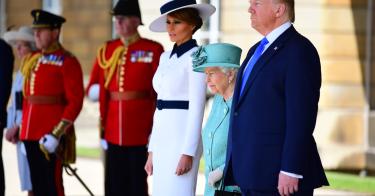After watching sumo wrestling and tasting sushi in Japan, President Trump is back stateside. But soon he will be on the road again for some statecraft in Britain and a historic visit to the Normandy beachheads of World War II.
The last time President Trump traveled to London the reception was noticeably chilly. The mayor was a vociferous Never-Trumper. No warmth emanated from Prime Minister Theresa May. And, a giant orange-haired baby balloon shadowed the president’s every appearance.
Not much has changed since then. The mayor remains in office -- and still in need of anger management classes. May is still in No. 10 Downing Street, though she will officially step down not long after Air Force One goes wheels up. And protest organizers have confirmed that the 20-foot Trump baby blimp will be back on the scene.
But none of that really matters. Anti-Trump histrionics across the pond are not much different than they are here, and public opinion is unlikely to shift, even if he gets to take tea with the queen and hang with the royal family.
If there’s a discernible absence of cordiality ... so what?
Topping the list is, of course, is Brexit. Trump is famously pro-Brexit, and by the time Trump lands in London, the Conservative party will be well on its way to picking a new leader -- one who will be committed to leading the U.K. out of the European Union.
Right now, the deadline for Brexit is October. Expect the new leader to commit to that. Don’t be surprised if, in the end, the government rejects the EU’s last-offered conditions for leaving and opts for the so-called “hard Brexit” -- i.e., just up and leaves.
Trump’s No. 1 job is to deliver the message, “Don’t worry. Be happy.” Britain will thrive after Brexit, and post-Brexit Britain’s “special relationship” with the U.S. will be as special as ever.
To assure the Brits that this will be the case, Trump should reaffirm his unshakable commitment to speedily conclude a U.S.-U.K. free trade agreement as soon as Britain is free of the EU while signaling to Congress his desire to pass enabling legislation as quickly as possible.
Job No. 2 should be to start revitalizing what has made the U.S.-U.K. relationship so special: our joint commitment to transatlantic security that spanned two world wars, a Cold War, and lots of messy stuff in between and after.
Trump and the new conservative leadership in London will need to work as a team. The NATO summit coming up in London at the end of the year will mark the alliance’s 70th anniversary.
As my colleague, Nile Gardiner, advises: “The President should underscore his administration’s unyielding and steadfast commitment to NATO while urging all NATO allies to follow the lead set by the U.S. and U.K. in meeting their defense spending commitments.”
The U.S. and Britain must also lead the transatlantic community in responding to the destabilizing rise of China. European views on how to deal with Beijing’s advances -- from the Belt and Road Initiative to Huawei’s 5G technology -- are a mess. Even the British are equivocal.
On the one hand, they acknowledge the danger of allowing Chinese intrusion into their national telecom systems. On the other, the government has concluded it can accept the risk of incorporating Huawei technology into “non-critical” parts of the network -- a “solution” that will likely fail to provide the level of security necessary to accommodate continued intelligence-sharing between the U.S. and the U.K.
Trump needs to reboot this conversation with the Conservative party leadership. The U.S. and the U.K. need to reach a common assessment of the threat and then lead the larger European community to forge a consensus on the matter.
That leaves one more agenda item: Iran. Here, the U.S. needs more support from the U.K. in convincing our transatlantic partners to move on from the Iran Deal and adopt a serious consensus strategy for managing Iran’s dangerous and destabilizing behavior.
It’s a lot to accomplish in one three-day visit, but if there is any room on the calendar after all these things are hashed out, then, by all means, make time for tea.
This piece originally appeared in Fox News on 6/2/19




